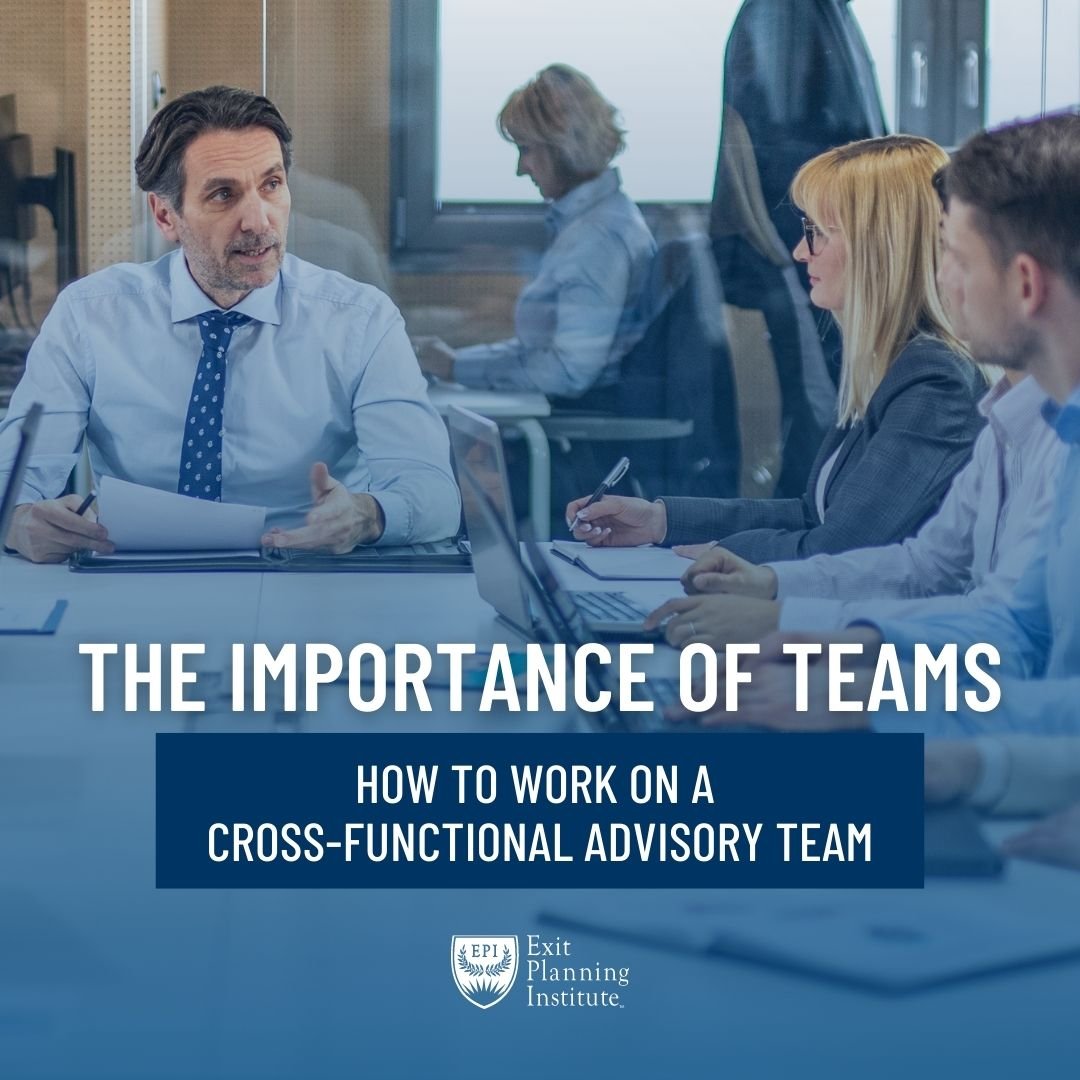
THE EXIT PLANNING BLOG
Keep up-to-date with exit planning, succession planning, industry trends, unique specialty insights, and useful content for professional advisors and business owners.
Share this
How to Work on a Cross-Functional Advisory Team
by Colleen Kowalski on May 24, 2022

Business owners work with a variety of advisors to ensure their business is not only successful but provides a significant financial impact for all stakeholders. An owner should work with a cross-functional team of advisors during their exit.
2022 Exit Planner of the Year, Justin Goodbread, emphasizes the importance of, “collaborating with as many CEPAs as you can. Even if you’ve been a business owner and have gone through the exit planning process on your own, it’s such a complex subject that nobody can possibly know all there is to know. Therefore, there is a great benefit to working with other CEPAs, for yourself and your clientele.”
Who is on the Owner’s Team?
Financial Advisor
The Financial Advisor will ask all the pertinent personal and financial questions to the owner. They remain on the owner’s team long after the exit has occurred. According to recent research conducted by the Exit Planning Institute, the Financial Advisor is seen as the owner’s most trusted advisor and as such, sits close to the owner on their transition team.
CPA
The CPA for many business owners is the most trusted advisor. For several years, accordingly to the State of Owner Readiness Research, when the owner was asked who is your most trusted advisor, nearly 40% of the owners responded with their CPA. The CPA provides a diverse set of services to the business owner along their entrepreneurial journey from tax preparation and advice, to financial statements, forensic accounting, auditing, and valuation. Typically the CPA is thought of as the advisor that helps the company thrive as they are heavily involved throughout the Value Acceleration Methodology.
Attorney
The Attorney is among the business owner’s most trusted advisors. Of business owners who stated they had a formal transition team in place, 61% included a business attorney according to the State of Owner Readiness Survey. The attorney provides legal advice on issues that impact the company across all four intangible capitals (Customer, Social, Human, and Structural.) They also play a critical role as a connector, as they may connect the owner to different types of attorneys along the way who help with more personal or personal financial capacities such as Estate Planning.
Growth Consultant
A Growth Consultant manages an owner’s business value and helps to unlock the wealth trapped in the business. They assess the personal, financial, and business goals of the owner prior to, during, and after their transition from the business. This Growth Consultant is also referred to as a Value Advisor and is usually a Certified Exit Planning Advisor (CEPA).
Board of Advisors
Our most recent Exit Planning Institute research shows that 91% of owners have a dedicated Board of Advisors. However, 8% indicated they used this Board of Advisors as their transition team, which is not recommended by EPI. The Board of Advisors will provide the owner and their family with valuable advice from individuals with years of experience working with other businesses, both corporate and family. They play a role on an owner’s transition team, but should not be an owner’s only resource during their exit.
Estate Planner
An Estate Planner helps you maximize a business owner’s wealth effectively while minimizing estate taxes. Their Estate Planner is instrumental in the creation of their Will, any Trusts for their children, and in organizing their charitable contributions.
Of those owners who had a formal transition team, 33% indicated an estate planning attorney was engaged, according to the latest Exit Planning Institute report. This attorney is likely different from the general business attorney described above and is more specialized.
M&A Advisor or Investment Banker
These advisors are typically used if the business owner is going to sell to a third party, considered sell-side work. That third party could be a strategic corporate, financial buyer, private equity group, or a public offering. They can also help their client raise money or work on the buy-side. They position the company for sale, managing the entire M&A Process including deal preparation, negotiating terms and price of the acquisition or merger, and arranging the sale of the company itself. These advisors can also be brought into the process early, before a sale, to give additional advice to the owner who may be thinking about a third-party sale in the longer term.
Risk Advisor
A Risk Advisor works with a business owner to mitigate and manage risks associated with the business and their personal needs. They must understand what risks are lurking in the owner’s business and any personal risks associated with it. Identifying business risks is the first step toward building significant value. Even before an owner transitions the business to the next owner or liquidates the assets. These advisors provide general business liability insurance, cyber security insurance, key man insurance, life insurance, and sometimes manage company healthcare benefits.
Family Members and Family Business Advisor
An owner’s family directly impacts their business decision-making. Everything the business owner does, impacts the family directly and the families of their employees, partners, and vendors. 84% of owners stated they meet with their family annually to discuss the business. Additionally, 12% of owners consider their spouse to be their most trusted advisor.
Some owners will set up a family council which acts similar to a business board of advisors. They assist in managing disputes between the family and business. When an owner sells likely their largest asset, it greatly impacts the family. Some businesses have family operating in the business, but even if it is not a “family business” the sale impacts all family members.
Working Collaboratively as an Exit Planning Team
Accountability is the backbone of any successful team. On an owner’s team, advisors must work collaboratively to manage the owner’s business, personal, and financial goals. Business owners that surround themselves with a holistic team of advisors and professionals will be more successful in their transition. Whether that be a sale to a third party, private equity, a family transition, or any other exit option.
Attend an upcoming Certified Exit Planning Advisor credentialing program to become your business owner client’s most valued and trusted advisor.
Do you play a different role on an owner’s team? Let us know!
Share this
- Blog (550)
- CEPA (433)
- exit planning (249)
- CEPA community (189)
- Business Owner (176)
- Exit Planning Summit (101)
- EPI Chapter Network (89)
- Value Acceleration Methodology (81)
- Exit Planning Partner Network (76)
- EPI Announcement (50)
- Content (48)
- Webinars (37)
- Excellence in Exit Planning Awards (34)
- Marketing (30)
- 2024 Exit Planning Summit (28)
- 5 Stages of Value Maturity (26)
- Books (24)
- EPI Academy (24)
- EPI Team (22)
- Exit Planning Teams (22)
- Leadership (21)
- 2023 Exit Planning Summit (20)
- family business (20)
- women in business (19)
- Intangible Capital (18)
- Exit Options (17)
- Black Friday (16)
- CPA (15)
- Walking to Destiny (15)
- Chapters (14)
- State of Owner Readiness (14)
- charitable intent (13)
- Chris Snider (12)
- National Accounts (12)
- Small business (12)
- personal planning (12)
- Financial Advisors (11)
- Season of Deals (9)
- 5 Ds (8)
- About us (8)
- Podcast (8)
- Scott Snider (8)
- Insiders Bash (7)
- Christmas (6)
- Exit Planning Content Library (6)
- Case Studies (5)
- Owner Roundtables (5)
- Three Legs of the Stool (5)
- Value Advisors (5)
- financial planning (5)
- Awards (4)
- Circle of Excellence (4)
- DriveValue (4)
- EPI Thought Leadership Council (4)
- Exit & Succession (4)
- Five Ds (4)
- executive training (4)
- Owners Forum (3)
- author (3)
- forbes (3)
- Exit Is Now Podcast (2)
- Peter Christman (2)
- Veteran (2)
- Whitepapers (2)
- Annual Exit (1)
- Business Owners Forum (1)
- SOOR (1)
- business consultants (1)






